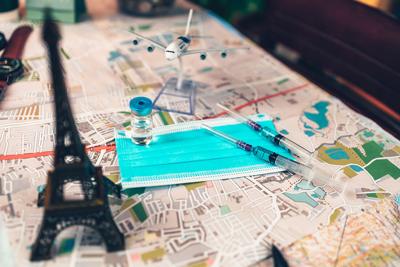Preparing for travel includes taking stock of health measures needed before, during and after travel, especially when visiting countries outside of the states.
The U.S. Centers for Disease Control provides some actionable items to maintain health as well as be forearmed for health issues while traveling.
The agency also provides details on what vaccines or medicines are needed when traveling to specific destinations as well as what diseases or health risks are a concern while in the destination.
Make sure all vaccinations and boosters are up to date, and get any new vaccinations specifically recommended for the travel destination. If traveling to a new climate, there may be exposure to diseases to which a traveler does not have immunity.
The CDC reminds travelers to take recommended medicines as directed by their physician. “Counterfeit drugs are common in some countries, so only take medicine that you bring from home,” says the CDC. Pack medications for the duration of the trip, plus extra in case of travel delays.
Plan to how to get health care overseas if needed. Seek mental health support within the destination if needed whether traveling domestically or abroad, especially if currently seeing a mental health provider.
Find a provider or hotline before embarking on a trip. Groups like Alcoholics Anonymous and Narcotics Anonymous may have English-language meetings at the destination.
Procuring travel insurance can be a stress reliever, especially if traveling out of the U.S.
The traveler should first find out if their health insurance covers medical care abroad. Travelers are usually responsible for paying hospital and other medical expenses out-of-pocket at most destinations, says the CDC website.
Consider buying additional insurance that covers health care and emergency evacuation, especially if traveling to remote areas.
While traveling, food and water safety is important. Only eat well-cooked food. Avoid eating from roadside stands and uncooked foods, like salad and raw vegetables.
Drink bottled beverages only, including bottled water. This is especially important if traveling in resource-limited regions.
Hand hygiene is important at home and overseas. Wash hands often using soap and hot water. Avoid crowded places, follow respiratory etiquette and consider masking.
Mosquitos and bugs can transmit parasites and diseases, like yellow fever and malaria. Use mosquito repellents. Mosquito nets may be appropriate in some parts of the world.
The U.S. embassy located in a traveler’s destination can help an American traveler locate medical services. Officials also will notify family and friends in the event of an emergency.
After the trip, be alert to physical or mental health conditions that showed up after returning home.
When noticing any differences, check in immediately with a health care provider. Prepare to relay any details from a recent trip, including activities, food, and medicines or supplements taken.
Source: Adapted from “Stress in Travel” on the Centers for Disease Control website.















